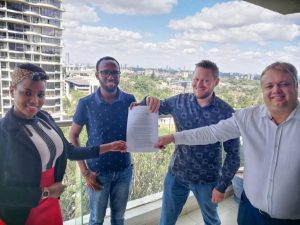On the 10th of July 2020, Helios Holdings Limited announced a merger with Fairfax Africa Holdings Corporation to form Helios Fairfax Partners Corporation – a pan Africa focused alternative investment manager. On the same day, Eversend, an African fintech startup also announced over a $1M raise through crowdfunding. Prior to that Helios announced a $100M investment from the Commonwealth Development Corporation (CDC) into their fund IV. On the 1st of July 2020, our portfolio company, HoltelOnline announced the acquisition of two travel tech companies. On 30th June 2020, MSF Africa announced the acquisition of fellow fintech Beyonic based in Tanzania. On 23rd June, 2020 Acumen announced their exit from KopaGas of Tanzania as part of the $25M acquisition by Circle Gas. Then on 22nd January 2020, Paga announced the acquisition of Apposit an Ethiopian software company as the entry strategy into the market. These recent deals have created undeniable momentum in mergers and acquisitions in Africa – with majority in tech — setting an unexpected tone for more positive developments in the second half of 2020 during this COVID crisis.
Whilst Covid19 has brought unimaginable devastation to the world and stoked racial revolt in America, which is now spilling over to Europe, in Africa, our fast adaptation to the new normal spared us not only mass casualties and pain, but the lockdowns triggered an unintended consequence of speeding up the digital economy. This resulted in investments in the second quarter like our portfolio company Zulzi closing $2.5M and AMP Global Technologies closing a $2M prior to COVID19 setting the stage for our Africa original content format and series launching this quarter @ www.takebackthemic.com. Then on 24th June 2020, Ingressive Capital closed their maiden $10M seed fund to invest in tech companies across Africa. On the same day, the Africa Venture Capital and Private Equity Association (AVCA) published their VC in Africa report for 2014 to 2019 showing a total of 613 deals totaling $3.9B with 2019 recording $1.4B of those transactions. Majority of those deals happened in South Africa, Kenya, Nigeria, Ghana and Egypt. South Africa, Kenya, Nigeria and Ghana are four of the KINGS countries (excluding Ivory Coast) that I had postulated back in 2013 would be leading the digital economy in Africa. Ivory Coast was replaced on the list by Egypt partly because of the civil war of 2011 that ousted incumbent president Gbagbo and set back the country’s development tremendously.
A lot of these deals were surely in the pipeline before COVID-19 but the fact that they still materialized is a function of resilience and the positive unintended consequence of the lockdowns across the continent. This momentum we are seeing in tech M&A is the result of the Capital, Capacity and Community building that has gone into the sector over the years which was accelerated by the COVID-19 lockdowns making online the new normal across Africa.
Off course some deals did not materialize, and we have seen some funds shut down due to the harsh environment. We have also seen African innovators launch innovations that are tackling the virus head-on and some of them could be big winners in the not too distant future. Some of these entrepreneurs have had to adapt and pivot under unusual conditions to launch these new ventures and also keep their boats sailing. The ingenuity of African entrepreneurs and tech ventures were put to great test under COVID-19 and some like HotelOnline a travel tech venture, which was severely impacted, pivoted towards a new business model. By the end of March, revenues had gone down to 20% and Endre Opdal the CEO was under intense pressure. His first move was to trim down the operations and staff which the board approved. The second step was evaluating the existing business to find the right pivot.
As investors and board members we rolled our sleeves and engaged with him to review things systematically – it was in that process that he came up with a new business line. The new line was always there in our blind spot but when necessity kicked in, we were able to spot it. We did not need to do any heavy lifting except to implement it right away with some minor tweaks. The new business line fetched $20K revenue in April increasing to $30K in May to make the business profitable again. This spoke to the speed of execution of the management team from loss-making in March to profitability in May. A second business line is now being implemented and yet to show results but a parallel process to make acquisitions of companies that were struggling under the crisis also gained momentum in April. On July 1st Hotelonline announced the acquisition of AfricaBookings and Cloud9 – two travel tech companies that were going under.
Cloud9 has had an existing working relationship with HotelOnline through our senior management team and that working relationship has been in place. They grew very fast and in 2019 merged with Heartbeat Venture. Cloud9 is one of the portfolio companies of the Mesozi Group whose other company is Marketforce which raised $350K from Viktoria Business Angel Network in May 2020. Whiles their Marketforce venture is doing well under the crisis Cloud9 got severely hit so instead of shutting it down they agreed to an acquisition which now gives them shares in Hotelonline. Africabookings was started by Bruce Tappings and had Kanak Puri as one of their investors who was also an investor in HotelOnline. In May, Endre saw that they were shutting down due to the crisis so he reached out and by the end of June they consummated another share swap that allows HotelOnline to leverage their existing customer base across Africa.
Whiles a lot of the current transactions have been in the pipeline prior to Covid, the acceleration to digital models has increased investment activity to support organic growth as well as expansion through acquisition and consolidation opportunities. This should continue to grow in H2 as existing portfolios are stabilized in the new normal. Suggesting that the continent’s resilience to the virus has far reaching implication on the business front. As the continent begins to re-open in the second half of the year, we are most likely going to see more of such deals that would propel Africa’s 21st century agenda.

